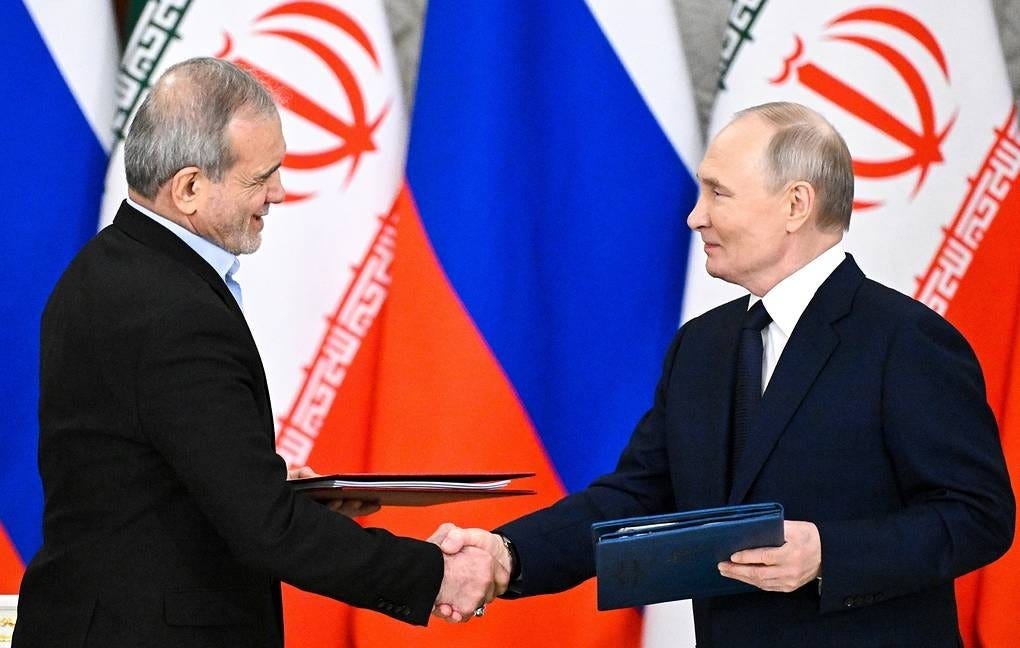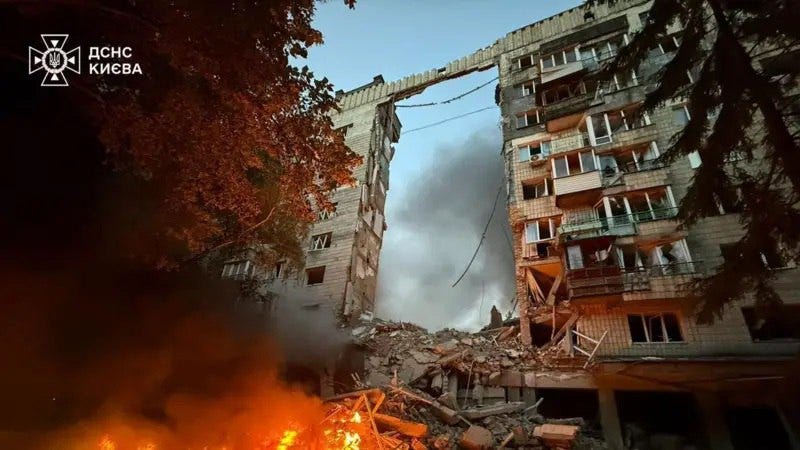Weekly Significant Activity Report - June 21, 2025
Israel expands its bombing of Iranian nuclear sites as the US waits to intervene, Russia sits out the war in Iran and ups demands on Ukraine, meanwhile China quietly builds up its own nuclear arsenal.
This week's analysis highlights some of the most significant news concerning America's adversaries between June 14 - June 21, 2025.
Summary
Israel bombs more of Iran’s nuclear facilities, but awaits a knockout blow only the US can give.
Russia sits out intervention in the Israel-Iran war, becoming the third time in three years Russia has stood by as an ally was attacked.
Vladimir Putin revives claims to Russian ownership of all of Ukraine, as the Russian military ups strikes on Ukrainian cities.
New report suggests China’s nuclear arsenal grew by 100 warheads in the past two years, the fastest growth of any country.
1. ISRAEL CONTINUES AIR ASSAULT ON IRAN; U.S. DELIBERATING ACTION
Israel Expands Bombing of Iranian Nuclear Sites
Over the past week, Israel has continued its campaign of air strikes to neutralize Iran’s nuclear program. Israel repeated strikes on the Natanz nuclear site it began during the opening hours of the war, destroying its above ground infrastructure. It also bombed the Arak and Isfahan nuclear sites this week. The bombing of the Arak nuclear site destroyed an unfinished heavy water reactor that could be used to produce plutonium.
Results of Israeli strikes on Iran’s Isfahan nuclear site on June 21. Source: Israeli Defense Forces Spokesman Avichay Ardaee (@IDFSpokespersonArabic) on Telegram
President Trump Gives Diplomacy with Iran Two More Weeks
On Thursday, US President Trump announced that he was putting off potential strikes on Iran for two weeks. President Trump has been regularly meeting with cabinet officials in the White House Situation Room to discuss the war and US intervention. Reports suggest that the President has become frustrated with Iran’s refusal to compromise on uranium enrichment and believes the Fordow nuclear site needs to be destroyed to set back Iran’s nuclear program. President Trump called for Iran’s “UNCONDITIONAL SURRENDER” in a June 17, 2025 post on Truth Social.
Takeaways:
The Arak reactor, though never completed, has been the source of anxiety over Iran’s ambitions for a nuclear weapon for decades. The reactor would have provided Iran with the ability to produce plutonium, enabling a secondary means of developing a nuclear bomb. Certain isotopes of Plutonium, such as P-239, can be more rapidly produced and weaponized than highly enriched uranium.
The long-term effect of Israel’s attacks on Iran’s nuclear sites on its overall enrichment program is still unclear. Much of the uranium enrichment at Iranian nuclear plants such as Natanz happens in facilities underground. The International Atomic Energy Agency (IAEA) believes that the destruction of the ground-level buildings at the Natanz nuclear facility have seriously damaged the enrichment process at the site, but that similar ground level strikes on other sites such as Fordow have had little or no impact.
President Trump’s decision to extend diplomacy comes amid increasing pressure from Israel for the US to join the war to destroy deeply buried Iranian nuclear sites. The two week delay is likely to raise Israeli anxiety about American engagement in the region and indecision more generally. Israeli leaders are likely concerned that the US may look for a compromise peace that gives Iran an opportunity to drag out negotiations and secure a face-saving diplomatic victory that allows it to continue a diminished civilian nuclear program.
The delay in strikes does not fundamentally change American targeting options. The sites Israel needs help striking, such as the deeply buried Fordow nuclear facility, will not be moving. Holding off strikes will give American planners more time to contemplate options and to watch for evidence of weakness in the Iranian regime which can be exploited either in negotiations or future strikes.
2. RUSSIA OFFERS LIMITED HELP FOR IRAN, ITS LATEST STRATEGIC PARTNER DUMPED
Putin Offers to Negotiate End to War between Israel and Iran; Claims Iran Not Interested in Russian Air Defenses
In a June 19, 2025 conference with international press, Vladimir Putin announced he could help broker a peace between Iran and Israel. Putin suggested an arrangement could be agreed upon that allowed Iran to continue to enrich uranium, while satisfying Israeli security concerns. US President Trump quickly shot down Putin’s overtures.
A notable moment in the press conference came when Agence France-Presse (AFP) Editor-in-Chief Karim Talbi questioned President Putin about Russia’s obligations to Iran under the Treaty of Comprehensive Strategic Partnership struck between the two countries in January 2025. The question provoked a prickly response from Putin.
Karim Talbi: The second part of my question also concerns Iran. There exists a Strategic Partnership Treaty between Russia and Iran. While it does not stipulate Russian defence obligations towards Iran, there remains the matter of weaponry.
Given the current escalation, are you prepared to supply Iran with new types of weapons to enable its defence against Israeli strikes?
Vladimir Putin: You know, we once proposed to our Iranian partners cooperation in air defence systems. At the time, our partners showed limited interest, and the matter concluded there.
Regarding the Strategic Partnership Treaty you mentioned, it contains no clauses pertaining to defence cooperation. That is the second point.
Thirdly, our Iranian friends have not made such requests of us. Therefore, there is effectively nothing to discuss.

Takeaways:
On January 17, 2025 Russia and Iran signed a Treaty on Comprehensive Strategic Partnership. The treaty came six months after a similar treaty was signed between Russia and North Korea. Russia has been eager to receive help for its own war from its strategic partners, receiving munitions, troops, and laborers from North Korea, and munitions and technology transfers from Iran. Russia’s now ubiquitous Shahed drone was produced using Iranian technology transfers in 2022.1
Russia’s own assistance to its newest strategic partner has been notably stingy. Beyond offering to mediate an end to the war, Russia has given little to no military support for Iran since the start of Operation Rising Lion. Iran’s own vulnerability to Israeli air strikes stems in part from its inability to procure replacements for its Russian air defense systems.
Russia has attempted to frame its comprehensive strategic partnerships as an anti-imperialist analogue for Western military alliances. The reality is that Russia’s treaties of comprehensive strategic partnership are less institutional arrangements like NATO and more regime-to-regime ties of convenience.
This is the third time since its invasion of Ukraine that Russia has left an ally in the lurch at a critical time. Russia abandoned its commitment to keep the peace in Armenia after a lightning offensive by Azerbaijan retook the disputed region of Nagorno-Karabakh in September 2023. Russia also largely stood by as a blitz by Syrian rebels toppled the Assad regime in December 2024.
Russia will ultimately not involve itself in a war between Israel and Iran because it is inconvenient for it to dispatch military support it needs for its war in Ukraine. The issue of convenience for Russia in responding to the urgent needs of its allies appears to be a feature, rather than a bug, of current alliances between Eurasian great powers. The Eurasian model of alliances, exemplified by Russia’s comprehensive strategic partnerships with Iran and North Korea, and no-limits partnership with China, serves primarily as an investment for the alliance’s top power, with trickle-down benefits for junior partners. The top dog gets prestige, diplomatic support and resources from junior partners as a form of tribute that provides incentives for continued cooperation. These partnerships lack shared values that are needed to drive long-term interests and thus create incentives for the top powers to limit their liability to unwanted external engagements that endanger the durability of their regimes.
This contrasts with the prevailing Western model of alliances such as NATO. Western alliances are more institutional in character, and driven by shared liberal values such as equity and democracy. This means they endure as short-term interests shift. This enduring nature makes Western alliances more of an insurance policy for the least powerful and most vulnerable alliance members, who can count on the alliance’s most powerful members to risk their own national interests to support them out of a sense of obligation to higher values.
3. WITH GLOBAL ATTENTION DIVERTED, RUSSIA RAMPS UP STRIKES AND DEMANDS ON UKRAINE
Russia Launches Massive Bombardments of Kyiv and Odesa
This week the Russian military conducted a series of large-scale air strikes on Ukrainian cities using dozens of missiles and hundreds of Shahed drones. Kyiv and Odesa suffered particularly intense bombings of residential areas on June 17. Over 35 apartment building were destroyed by Russian drones on June 17 in Kyiv, with one strike on a high-rise apartment complex killing at least 28 and injuring over 130.

Putin Revives Discussions of Absorbing All of Ukraine
Speaking at the St. Petersburg International Economic Forum on June 20, Putin reiterated claims that Russia and Ukraine are a single people and that all of Ukraine rightfully belonged to Russia. The claims echo those Putin made in a July 12, 2021 manifesto “On the Historical Unity of Russians and Ukrainians,” widely seen as laying the ideological foundation for the February 2022 invasion of Ukraine.
Takeaways:
As discussed in the May 20 Situation Report on US mediated ceasefire negotiations between Russia and Ukraine, Vladimir Putin has showed no real interest in compromising on his ultimate ambition of subjugating all of Ukraine to Russian rule.
Putin’s most recent statements, represent a shift in his publicly conciliatory tone toward President Trump’s push for a negotiated settlement to the war. The statements likely reflect a deliberate effort by the Kremlin to rally nationalist sentiment for the war in Ukraine to distract from uncomfortable questions about Russia’s responsibility to support Iran and repeated warnings issued by Russian bankers and economists of an impending recession.
4. CHINA NUCLEAR ARSENAL GROWING FASTER THAN ANY OTHER COUNTRY
A new report by the Swedish think tank Stockholm International Peace Research Institute (SIPRI) announced that China is developing its nuclear arsenal faster than any other country. China’s nuclear buildup has been concentrated in its intercontinental ballistic missile (ICBM) force, which has grown by 100 warheads since 2023. China’s ICBM force may reach parity with the US and Russia by 2030.
Source: Jason Faust “A Geospatial Strategy to Locate Future Chinese ICBM Silo Fields”. Tearline, (National Geospatial-Intelligence Agency). May 12, 2022. https://www.tearline.mil/public_page/china-icbm-silo-fields#authors
Takeaways:
China’s rapid nuclear arms buildup has thus far attracted little attention in the US because of the wars in Ukraine and the Middle East, not to mention the general upheaval of US domestic politics. That is likely to change. Once China nears 1,000 nuclear weapons in the coming five years, US policymakers will become much more concerned as the full scope of its buildup becomes more apparent. At this point the speed of China’s arms development will likely appear more sinister and destabilizing due to its absolute size.
Controlling China’s arms production will be difficult as China has long rejected participating in existing arms control agreements. Getting China to sign on to new strategic arms control treaties will prove even more elusive now as Russia has exited long-standing agreements, and both countries link their participation with broad concessions on Taiwan, NATO and Ukraine.
Agreeing to Chinese and Russian demands, however, is strategically unwise. Russia, under Vladimir Putin, has regularly ignored complying with previous arms control agreements. China selectively complies with international agreements, and repeatedly violates aspects of agreements it feels constrain its national interests.
If China continues its rapid arms development and does not agree to arms control with the US, policymakers in Washington will likely feel pressured into backing reciprocal buildups of nuclear weapons or ICBM defenses that could fuel a strategically destabilizing arms race.




